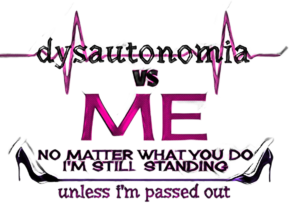Dysautonomia is a terrifying array of symptoms which can affect every system in the body, including blood-pressure, heart-rate, breathing, sleep, digestion, balance, vision, memory, temperature, pain centers, emotions, and more. In short, dysautonomia prevents the body from operating as designed.
DEFINITIONS
Breaking down the word DYS–AUTO–NOMIA:
dys – from the Greek, meaning bad, abnormal, imperfect
auto – from the Greek, “autos,” meaning self
nomia – from the Greek, “nomos,” meaning law, government, system, regulation
A nominal definition of the term “dysautonomia” is that the body’s ability to regulate itself has become abnormal. The medical definition is that the Autonomic Nervous System [ANS] has become dysfunctional.
WHAT ACTUALLY HAPPENS?
The unconscious management of & between the two halves of the ANS, the Sympathetic Nervous System [SNS] & the Parasympathetic Nervous System [PNS] has broken down. The systems are out of sync individually & with each other.
As this discord causes↓blood-pressure to fall↓the↑heart-rate rises↑to compensate, resulting in fainting. There can be an inability to perspire, vertigo, nausea, frequent UTIs, headaches akin to spinal fluid leak headaches, brain fog, painful fibromyalgia, & inappropriate anxiety that could eventually turn into emotional instability. If not arrested by appropriate treatment the process will continue wreaking havoc. It may start slowing motility in the stomach causing gastroparesis, which can lead to extreme weight loss & malnutrition.
Further problems arise with the kidneys. Unable to hold onto sodium, the sodium/fluid ratio becomes unbalanced & blood volume is decreased (except during pregnancy, a time when many women with dysautonomia feel much better). As a result of the imbalance blood-pressure can drop precipitously on change of position, most commonly during the simple act of standing. Instead of rising to where it’s now needed, the heart & the brain, the blood remains pooled in the legs. What happens automatically for everyone else doesn’t happen at all for dysautonomia patients. As this failure begins to be discerned one gets down to the floor fast or one will faint & fall to the floor. It happens to men & women both.
No matter how much fluid is consumed, including Gatorade & other electrolyte drinks, it cannot fully compensate for the imbalance. The drinks help but are not a cure. Proper treatment is what’s needed or the outlook is grim. And because there are different forms of dysautonomia treatment is not one size fits all. Some folks with dysautonomia have high blood-pressure, so Gatorade would NOT be good for them.
HOW TO NOT PASS OUT (as per Dr. M)
While I slowly titrate my way up to the therapeutic dose of a new medication to treat the dysautonomia (off-label use), I’ve had to go back on Gatorade. It’s helping a lot. Although this site does not give medical advice, I will share one piece of common sense advice that came to me from the doctor who saved my life & my father’s life, Dr. M. This advice is for those of us with low blood-pressure/POTS type dysautonomia. Dr. M advised Dad & me never to stand still if we were waiting on a line or looking at something on a shelf in a store. He said, “Make sure you jiggle your legs, or keep alternating your weight from one leg to the other. It gets the blood moving & can give you more time to do what you’re doing.” Dr. M also had me wear anti-embolism stockings. Dad was already wearing compression hose due to Peripheral Artery Disease. Even so, if we were out somewhere & forced to stand for awhile – like waiting on line at the doctor’s office to sign in – I had to remind my father ALL THE TIME: “Dad! Jiggle your legs!” He’d roll his eyes but start jiggling – because he knew that was better than suddenly “getting the feeling” & passing out. So people, NEVER stand still. JIGGLE YOUR LEGS!
BEDTIME & DYSAUTONOMIA
Bedtime is a wakeful nightmare for most dysautonomia patients. The PNS is supposed to be taking the hand-off, as it were, from the SNS. Unfortunately, the parasympathetic system cannot overcome the always on sympathetic system, thereby preventing sleep, which leads to a myriad of other difficulties. The SNS is constantly sending its owner adrenaline to prepare for fight or flight, neither of which can he do since he’s either too exhausted to move or already passed out.
SHODDY TREATMENT OF PATIENTS
Another aspect of this condition bears mentioning. Undiagnosed dysautonomia patients endure (sometimes for years) demoralizing experiences at doctors’ offices. The patient comes in feeling faint yet the physician detects “normal” BP at the brachial artery – the inner elbow. At this “normal” finding some doctors become dismissive of the situation, mentally marking the patient as a hypochondriac or liar.
Uninformed MDs fail to realize that in this instance the BP drop is occurring in blood vessels in the brain, bringing the patient to near or actual syncope. Most of the time low BP will reflect in the arm as well, but not all the time. For susceptible individuals being in the sun, even being next to a light, can dilate superficial vessels enough to affect a drop in blood-pressure. Showers are practically a no-no. You gotta get out fast & the water can’t be too hot. Even then you might pass out. Proximity to heat from the stove or oven can also bring on fainting, as can hot water from the sink, folding hot clothes straight from the dryer, ironing with steam & blow-drying your hair. I trust it’s understood that summer is the worst time of year for low BP dysautonomiacs. (Have I just coined a new word?)
So many medical practitioners entirely discount dysautonomia patients symptoms & offer no help. Let’s remember they’re not gods they’re people practicing what they were taught a long time ago. Scores of these people were taught nothing about dysautonomia. Unable to feign concern, a significant percentage of the untaught respond with condescension. Time to get rid of the hypochondriac & move to the next name on the list. You can hear them thinking it. How about doing a little research, doctor, to help these suffering patients? That this is still happening to people is unbelievable & unacceptable. Of course not all doctors behave this way, just too many.
HOW DYSAUTONOMIA AFFECTS FAMILIES
As challenging as it can be to “live” with this disorder (if it can be considered living), it is almost as difficult for the patient’s family to watch. They don’t know what to do, where to turn, or how to help. Imagine seeing a bus about to run over your spouse or child, while you stand there like a statue, unable to stop the bus or warn your loved one. And imagine it happening all day every day. Over time the feeling of impotence becomes corrosive to mind & soul.
Some family members manage very well. Later though you might find them crying in bathroom to release their stress. In worst case scenarios husbands or wives must assume all the duties of their now disabled spouses. It takes incredible fortitude to bear this overwhelming new life. Those without that inner strength may abandon the family, leaving devastation in their wake.
Children are perhaps the greatest casualties of dysautonomia. Mom or Dad has suddenly become incapacitated & is no longer able to care for them as before, which is bad enough. Even worse, one of the parents may have cut & run. Is it becoming clear just how dire the fallout of dysautonomia can be?
Ongoing research must continue if a cure is to be found. If you’re able please consider donating to Dysautonomia International.







A great explanation of dysautonomia & yes, you should contact Miriam Webster to have your newly coined word added to the dictionary or at least a medical one – dysautonomiac(s)!